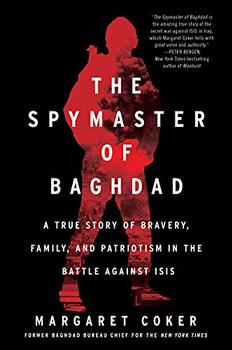Summary | Excerpt | Reading Guide | Reviews | Beyond the Book | Readalikes | Genres & Themes | Author Bio

A True Story of Bravery, Family, and Patriotism in the Battle against ISIS
by Margaret Coker
Even as a boy, the al-Sudani son had internalized the primal laws of Iraqi society. Predators prey on the weak, and under no circumstances should an Iraqi like him ever rely on the police, because they would as soon fuck you up, rape your mother, and leave your whole family for dead rather than help anyone, especially a poor Shiite like him.
Growing up in Saddam City, boys experienced a variety of casual violence, meted out as discipline at home or, even more toxic, from the sons of powerful families who mistreated the rest of the neighborhood with impunity. One reason that it was a blessing to be part of a large family was that there is strength in numbers. Brothers could be called on to defend one another against bullies and shakedowns. But even then, the tactic of strength in numbers could only be used in select circumstances.
When Munaf was in seventh grade, there was a boy in their neighborhood who was a year younger than him, a solitary boy named Salem who was an only child. Salem was easy prey for Hussein and his crew, a band of bullies led by the son of the neighborhood's informer, the man who reported to the mukhabarat, the secret police. No one could complain or fight back, because to do so raised the specter of jail, or worse, given the connections that Hussein's father had. So absolute was their reign of terror that the other kids called them the sheikhs of the street.
Almost every morning, the bullies would circle the streets between their homes and school and lie in wait for Salem. For the ten minutes it took to get to school, the pack would exhibit a finely calibrated kind of terror. They would surround the younger boy, trip and kick him, but to any passerby it would appear that they were all good friends. Salem had no escape from this daily torment. When he arrived at school, the principal would punish the boy for his disheveled appearance. Salem endured those whippings in silence as well, knowing the vengeance of the bullies would be greater if he told the principal what had happened to him. Some days, Salem feigned sickness to stay at the school building an extra hour to avoid the bullies on his way home. Other times, he tried to outrun them. But the next day, their hunt would start again.
Munaf felt sick to his stomach when he saw the bullies in action. But he knew that taking on the sheikhs was a foolhardy pursuit. Everyone knew that Hussein's father was likely responsible for the disappearance of the family whose house had become haunted. Munaf didn't want something like that to happen to his family, so he did what his father had always admonished him and his brothers to do. He kept his head down and stayed out of trouble. Munaf told himself that the bullying was good for Salem. Like all the boys in Saddam City, he, too, needed to learn fortitude to deal with life's brutality.
In a neighborhood with few televisions or other distractions, boys played outside until dinnertime. In springtime, the late-afternoon hours after school became as sacred to the neighborhood boys as the Ramadan fast, for that was the time when they could gather at the only empty lot within walking distance, the hard-packed sandy patch of land across the street from Munaf's uncle's house, and play soccer. While the boys changed out of their school clothes, they would press-gang their younger siblings who were playing nearby to pick up the rocks embedded in the earth. It was a hard task without any reward, as the field was reserved for the older boys only.
One afternoon, when Munaf was twelve, the street sheikhs were towering over Salem, forcing him to kneel on the ground in his clean school clothes and pick up stones with his mouth. Each time he dropped one, Hussein would cuff him behind the ear. Pick up the fucking stones, you dog, he barked at Salem. You have no life unless I say you do. You have no wishes except mine.
Munaf was standing on the far corner of the lot, but even from there he could see blood trickling from Salem's ear down his shirt collar. His eyes were squeezed shut and his face was wet with tears. Munaf walked on, pretending he hadn't noticed. Head down, eyes down, like his father always told him.
Excerpted from The Spymaster of Baghdad by Margaret Coker. Copyright © 2021 by Margaret Coker. Excerpted by permission of Dey Street Books. All rights reserved. No part of this excerpt may be reproduced or reprinted without permission in writing from the publisher.
Your guide toexceptional books
BookBrowse seeks out and recommends the best in contemporary fiction and nonfiction—books that not only engage and entertain but also deepen our understanding of ourselves and the world around us.